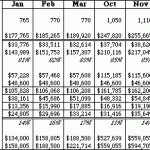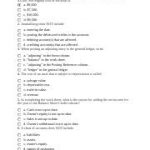Cash Basis Accounting vs Accrual Accounting

For nearly a decade, Toni Matthews-El has published business topics ranging from cloud communication software to best steps for establishing your own LLC. In addition to Forbes Advisor, she’s published articles for Medical News Today, US News and World Report. Our popular accounting course is designed for those with no accounting background or those seeking a refresher. By submitting this form, you consent to receive email from Wall Street Prep and agree to our terms of use and privacy policy.
See advice specific to your business

With that in mind, meticulous record-keeping is key to generating an accurate net income figure. Without properly accounting for entries like this, expenses could be understated and the net income figure misleading. In accrual-based accounting, your revenue counts when the transaction occurs, regardless of when the money arrives. Expenses get reported when they happen, even if the money goes out earlier or later. This method gives a more accurate picture of your company’s financial situation, but tracking and managing can take more work.
What Is the Difference Between Cash and Accrual Accounting?
If a small business is looking to reduce its expenses by managing its own bookkeeping, cash basis accounting may be a helpful option. In some cases, the accrual accounting method can pose a risk because it assumes all transactions will be fulfilled. If a customer delays payment or attempts to default, your budget https://www.business-accounting.net/5-000-surety-bond-cost/ will have to shift to account for a failure to pay. We’ll explore the key differences between cash and accrual accounting, who can use each method, and their implications for taxes. We’ll also look at the advantages and disadvantages of each so you can find the right method for your small business needs.
Types of financial reporting
If a client suddenly pays off a large invoice, you may have a lot of cash in your account, making your business look profitable. But if you have a large number of expenses that income has to cover, you’re not as profitable as you seem. All of the accounting software products listed below support accrual basis accounting, and some let you choose whether you want to view reports on a cash vs. accrual basis. Accrual basis accounting is typically best because it offers the most accurate information about your business’s performance. But its complexity may outweigh its benefits for simple, very small businesses.

With the cash basis method, the company recognizes the purchase in April, when it pays the bill. Whereas with the accrual basis accounting, the company recognizes the purchase in March, when it received the supplier invoice. Cash and accrual accounting are accounting methods appropriate for different companies, industries, and situations.
Accrual-basis accounting
- For investors, it’s important to understand the impact of both methods when making investment decisions.
- With accrual accounting, your income is recognized when you earn it, regardless of whether you’ve been paid.
- Accordingly, the information provided should not be relied upon as a substitute for independent research.
- Cash basis accounting is a method where revenue is recorded when the cash is actually received; likewise, expenses are recorded when they are paid.
- Companies might also use modified accrual accounting and modified cash basis accounting.
- Learn financial statement modeling, DCF, M&A, LBO, Comps and Excel shortcuts.
Likewise, accrual methods record expenses when incurred, with orders for inventory or supplies entered when the order is sent to the vendor, even when payment hasn’t occurred. The transaction impacts that period’s profitability, regardless of whether the invoice is paid or remains outstanding. Accounting involves recording, classifying, reporting, and summarising financial transactions, generally with the help of accounting software. Accounting aims to provide financial information about your business to its stakeholders and regulators and for tax purposes.
If you are unsure which approach is best for your business, it may be a good idea to seek professional advice to determine if your company should use cash or accrual accounting. Accrual accounting can be contrasted with cash accounting, which recognizes transactions only when there is an exchange of cash. Additionally, cash basis and accrual differ in the way and time transactions are entered. The general concept of accrual accounting is that accounting journal entries are made when a good or service is provided rather than when payment is made or received. However, for accrual accounting, the cash flow statement is required to understand the real liquidity position of the company.
One important thing to note, however, is that accrual basis accounting does not give you an accurate picture of your cash flow. If you use accrual accounting, you’ll need to keep a close eye on cash flow in order to avoid potentially devastating consequences. Specifically, it focuses on when money is received, or expenses get paid, which may not occur exactly when these items are accrued. Cash-basis accounting is also known as cash receipts and disbursements or the cash method of accounting. This system focuses on cash flow, with a particular emphasis on cash on hand.
Cash and accrual accounting differ in a number of ways, but the main difference is when income and expenses are actually reflected in a business’s books. Businesses that are eligible to use cash accounting almost always prefer to use that method because it’s simpler and more straightforward. Accrual basis accounting recognizes income and expenses when they are incurred. As its name implies, this method tracks accruals, which could be unpaid expenses or invoices that customers haven’t paid yet.
But the current year’s net profit or net loss still feeds into and alters the equity portion of balance sheets. Another way accounting and bookkeeping differ is that accounting is a broader field that covers a more comprehensive range of topics. You may be responsible for tax planning, financial statement preparation, and auditing as an accountant. On the other hand, bookkeepers are typically https://www.quick-bookkeeping.net/ only responsible for recording transactions and keeping track of financial data. Read this guide to discover financial reporting and the different accounting systems, accounting software, and whether you can do your own small business accounting. We’re here to help you choose the right accounting strategy to provide accurate insight into the financial health of your business.
Your customer’s invoice payment, on the other hand, wouldn’t be recorded until July, since that’s when you received and deposited the check. That timing discrepancy could make it difficult for you to determine whether that job was profitable. Under accrual accounting, firms have immediate feedback on their expected cash inflows and outflows, making it easier for businesses to manage their current resources and plan for the future. Accrual accounting is always required for companies that carry inventory or make sales on credit, regardless of the company size or revenue.
Many of these courses are self-paced, so you can build your competency at your own pace. Consider this Financial Accounting Fundamentals course offered by the University of Virginia or the Introduction to Finance and Accounting course offered by Wharton Online. Yarilet Perez is an experienced multimedia what is the difference between operating and non journalist and fact-checker with a Master of Science in Journalism. She has worked in multiple cities covering breaking news, politics, education, and more. A financial professional will offer guidance based on the information provided and offer a no-obligation call to better understand your situation.
